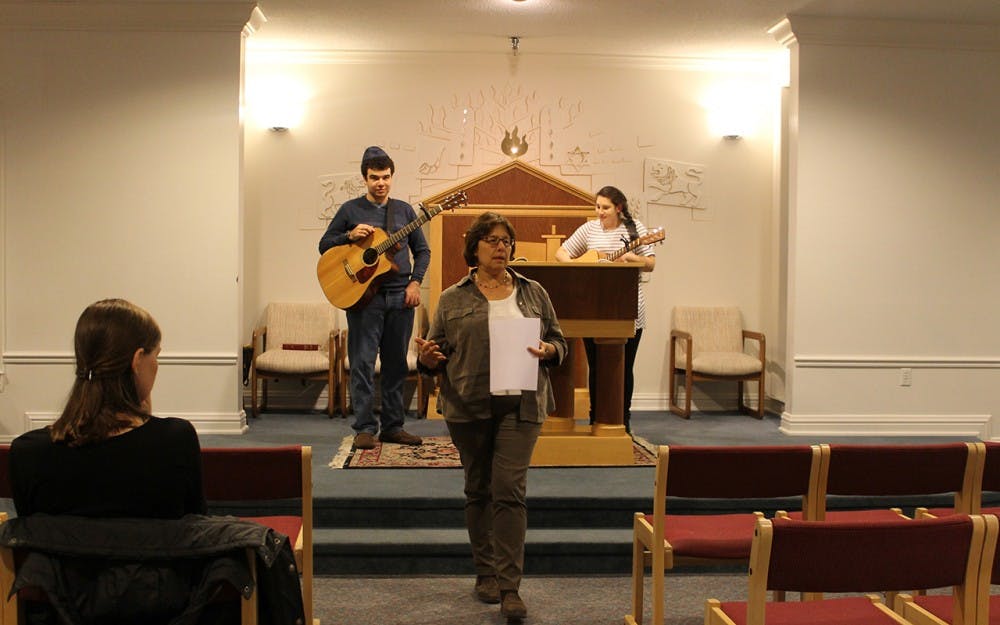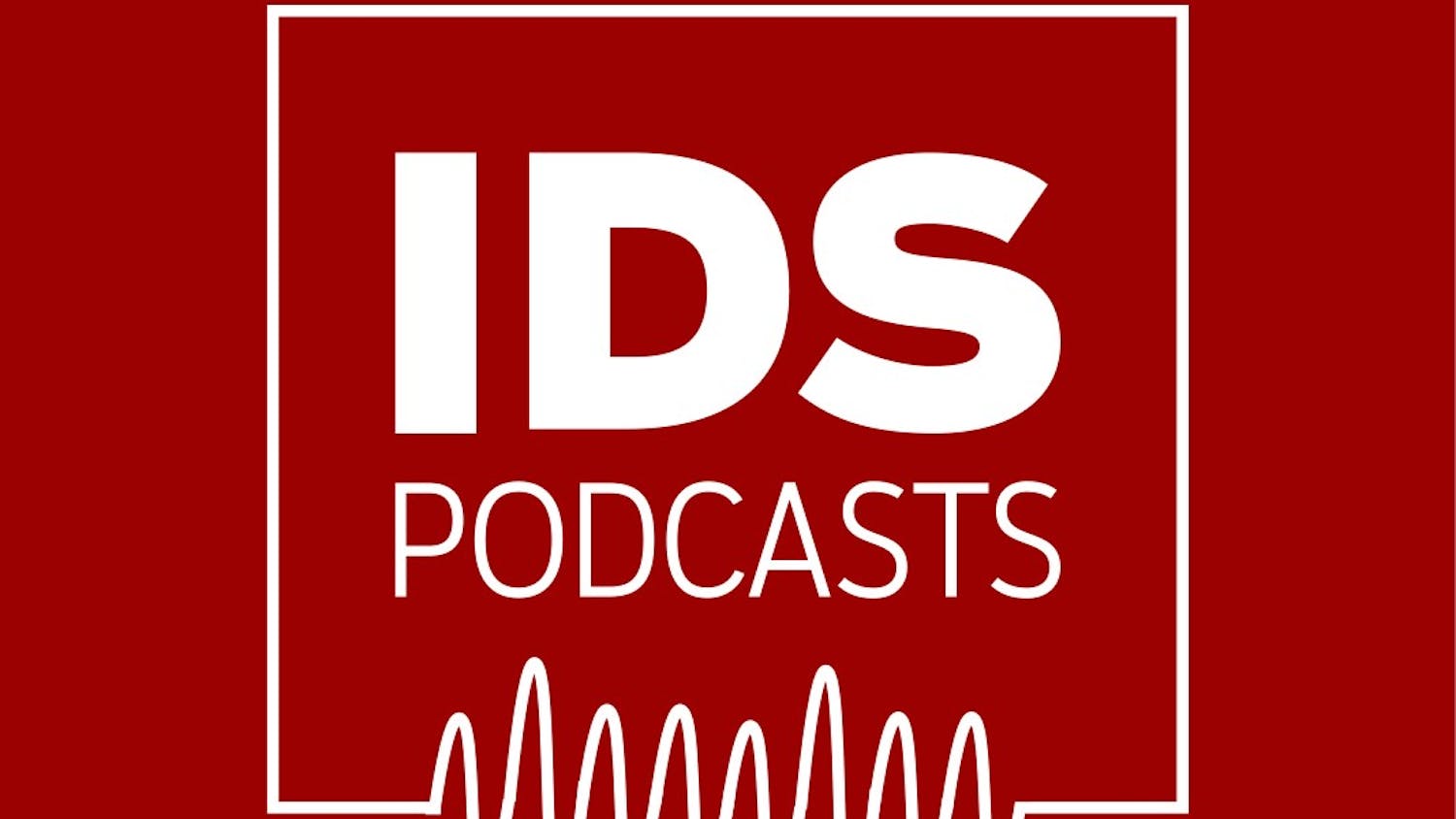The Islamic Center of Bloomington’s imam makes the call to evening prayer Friday, and the people lining the walls of the room gather in the center to shake hands and face east. Small children run to join older men.
A sign with movable type lists the day’s prayer times, which change to correspond with the rising and setting of the sun. Those praying stay close together to prevent the devil passing between them.
Rachid Maidi, a longtime member of the Islamic Center of Bloomington, said the mosque’s members have been on edge after the shooting at a mosque in Quebec City the week before. When he arrived at the center that day, the door was hanging open, which made him uneasy. Members are usually careful to shut the door behind them when they leave.
Events in the United States, particularly President Trump’s executive order banning international travel to the U.S. from seven Muslim-majority countries, have left many on edge, too. Rachid said he has strong feelings against the order and that it is playing politics with government leaders and ignoring the people.
The ICB invited the Bloomington community to come to the mosque to learn more about Islam last Friday and to watch the evening prayers.
A few dozen barefoot Bloomington residents sat in folding chairs in the men’s prayer room and asked Ashraf Abdelhafez, the center’s president, and Anna Maidi, the center’s women’s president, questions: Are there different versions of the Quran, just as there are of the New Testament? Must you be fluent in Arabic to be a Muslim? What is the process one must go through to convert?
Last Friday in the Indiana Memorial Union’s Bryan Room chairs and couches were shoved to the walls and replaced with prayer rugs for the Muslim Student Association’s weekly Jummah, or gathering for prayer.
Their call to prayer used to be yelled across campus, but after complaints, that practice was stopped.
“People get uncomfortable with Muslim things they don’t understand,” IU senior Fariha Hossain said.
[Religious organizations on campus respond to Trump | IDS]
A few days later, a parishioner at St. Paul Catholic Center read from Isaiah 58:7 at Sunday Mass: “Share your bread with the hungry, shelter the oppressed and the homeless; clothe the naked when you see them, and do not turn your back on your own.”
In his homily, the sermon after the readings, Father Patrick Hyde discussed the need to listen to opposing viewpoints.
Hyde said it is easy to say that anyone who agrees with actions like Trump’s executive order on immigration is a bigot, but he asked the churchgoers to engage in conversation and listen to each other instead of jumping to conclusions.
“We have every right to be angry, upset, frustrated,” Hyde said. “We don’t have a right to be a jerk. We don’t have a right to dismiss other people because what we want is not for them to agree with us but for them to be converted in heart and mind and faith.”
After the Mass, Father John Meany talked about the executive order more explicitly. The Catholic Church has supported and taken in refugees for years, and it has a responsibility to do so now especially because the U.S. has the capacity to take in many more refugees, Meany said.
“We really have an obligation to welcome the aliens and the ones who are in need,” he said.
Across campus at the Helene G. Simon Hillel Center, Rabbi Sue Silberberg talks about the Jewish teaching of tzedakah, which relates to justice and charity. Part of tzedakah means it is a moral obligation to help the most marginalized and persecuted of the world, she said.
Today, these persecuted people are often those from Muslim-majority countries that are demonized for their religious beliefs, Silberberg said. However, Jews have also been targeted and persecuted throughout history before the Holocaust occurred.
Because of this history of oppression, Silberberg said it is even more important for Jews to stand against the persecution of others.
“We cannot be silent,” she said. “The Holocaust happened because people stood silently by and allowed it to happen. We can’t let something like that happen again. We have to stand up.”
***
In the Islamic Center, Rachid wondered aloud why the executive order listed those seven specific countries. He thinks the world’s Muslims have strength in numbers.
Tackling the threat of extremism is more complicated than President Trump’s administration is making it seem, Rachid said. Framing terrorism as being solely against American values is incorrect.
He is from Algeria and said the ethnic makeup of the mosque changes with the student population at IU.
In the past there were many Indonesians, but now he sees many people from Saudi Arabia.
Still, there are people from all over the globe who come to pray there.
“He created us from different tribes so we can know one another,” said Rachid, referencing God.
“This business of racism is forbidden,” he said.
Mohammed Alruwaili sat across from Rachid. Alruwaili, a Saudi member of the mosque, said when he arrived in Bloomington last January, he had no knowledge of English or American customs.
When he met Rachid, he asked him what color he was. Rachid says this is a popular saying in Arabic, a traditional way to ask about someone’s mood.
“I’m the same color as you are, brother,” Rachid said.
Reporting by Jesse Naranjo, Rachel Leffers, Brooke McAfee and Christine Fernando
Compiled by
Sarah Gardner
The IDS sent reporters to the Monroe County Courthouse and the Indianapolis International Airport to cover protests in the days following President Trump's 90-day travel ban. This is what they saw.




